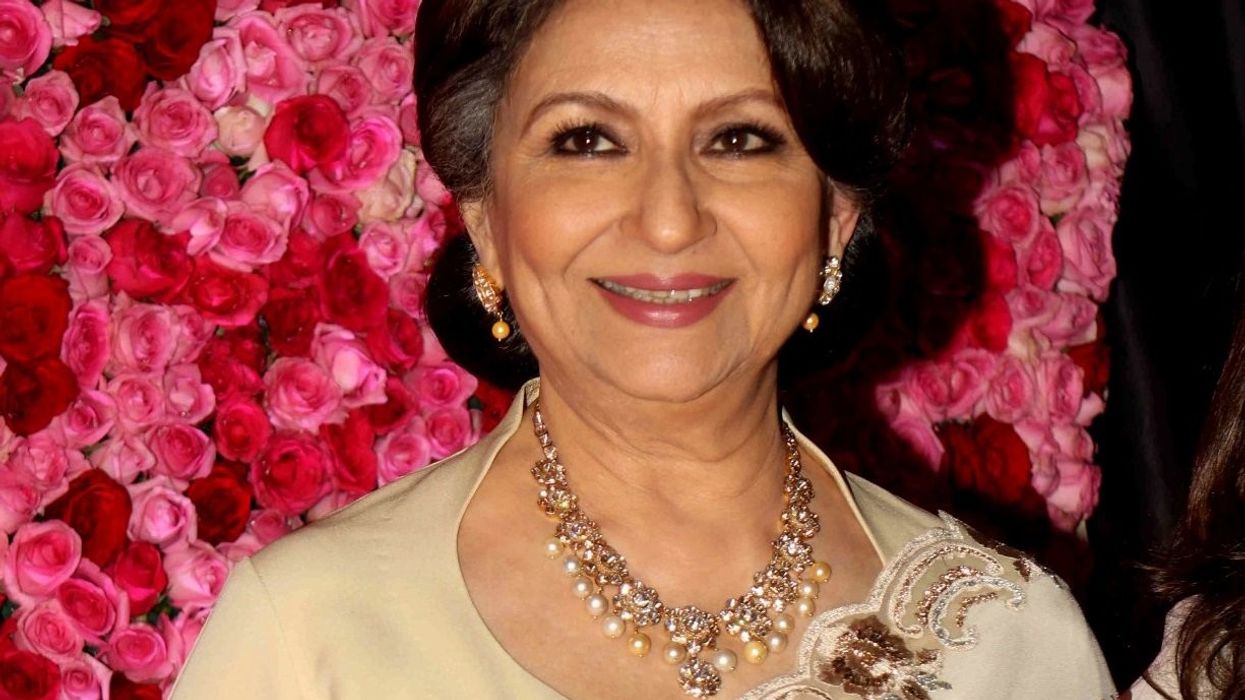The Hindi film industry is still a "little ageist" with few roles for women of a certain age like there are in Hollywood for Meryl Streep, Judi Dench, or Maggie Smith but things are changing, albeit slowly, says veteran actor Sharmila Tagore.
Streaming space could be a game changer, says the 78-year-old who returns to films after 2010's Break Ke Baad with family drama Gulmohar.
"We are still slightly ageist, especially with women because powerful roles go to the men. Like special scripts are being written for Mr. Amitabh Bachchan, Anupam Kher, but not for Waheeda (Rehman) ji and not for many other aging lady actors," Tagore told PTI.
“Cinema reflects society so the economics of the film matter. Of course, you have to bring in the audience. What comes first chicken or the egg... That's the kind of decision that the captains of the industry have to make. But, things are definitely changing. There are wonderful, more mature actors,” she said.
Hindi cinema is not where Hollywood is in terms of offering roles to older women. "There are wonderful, more mature actors, Neena (Gupta) for instance, she is a magnificent actor. There are many others... OTT is full of wonderful performers. It will take time but it will change.
Discussing the lack of strong roles for actors of her age, the Hindi film veteran, who started her career in cinema with Satyajit Ray's "The World of Apu" in 1959, cited the examples of Meryl Streep, Judi Dench, and Maggie Smith.
"It will happen here," Tagore said confidently.
The potential for female actors to portray a strong and independent woman onscreen has increased over time, and Tagore is delighted to see this change.
"It was more hand wringing, more ‘beta beta’ earlier," she said.
“…‘Piku’ (Deepika Padukone’s film, in which Amitabh Bachchan featured as her father) was the one where a woman is looking after the father, which is unheard of, would not be accepted, like how can she look after? What her 'aukaat' (status) was, what is her earning power? But it is possible and people accepted that. There are little nuggets of change because there are a lot of working women in the top position of the company,” she added.
The actor spoke of her desire to learn new things from the younger generation.
"I am at the end of... not life yet but working life. It is very nice to work with young people from crew to cast, it is a different energy, it is a nice experience,” she said.
Tagore, known for her roles in Ray's "The World of Apu", "Devi" and Hindi movie hits such as "Kashmir Ki Kali", "Aradhana", "Amar Prem" and "Chupke Chupke", is eager to learn new things in life, even a foreign language.
“I am learning so many new (things)…I had no idea what OG was, now I know, OG is original. You need to be curious and learn, like if it is the lingo of young people, you have to learn that.
"Inaaya (her granddaughter) is teaching me new words. She is playing chess and learning Spanish, I don’t want to compete with her but I don’t want to be left out. I want to learn a little bit of Spanish,” she added.
Tagore said she is thrilled to be playing a a progressive woman in “Gulmohar”, directed by Rahul V Chittella and also starring Manoj Bajpayee.
The National Award-winning actor plays Kusum, the matriarch of the Batra family. Actor Manoj Bajpayee will be seen as her onscreen son Arun in the movie.
"‘Gulmohar’ is showing a woman of a certain age being independent, being her own person. That is why I am very happy about the character that I am playing, it is very progressive,” she said.
The actor said she instantly fell in love with the script of "Gulmohar", a story with many layers despite being a simple family drama.
The movie revolves around the multi-generation Batra family, who are all set to move out of their family home after 34 years. This moving out triggers a re-discovery of the bonds that have held them together as a family.
“It was a four-day story. It was about a family that lived together but now they are about to scatter, each going their own way, each having anxiety about leaving and yet looking forward to another new chapter in their life. There were many layers to this story, it was not just in a linear way. It is an ordinary story, it is very relatable, it is happening in every house,” Tagore said.
The movie is written by Arpita Mukherjee and Chittella, who also serves as a director. He has previously made the short movie “Azaad”.
“Gulmohar”, which also features Amol Palekar, “Life of Pi” fame Suraj Sharma, Simran Rishi Bagga, and Kaveri Seth, is produced by Star Studios in association with Chalkboard Entertainment and Autonomous Works.
It will be released on Disney+ Hotstar on March 3.
Ask Tagore if she will appear more in films now, she said, she doesn’t believe in making plans. After the release of “Gulmohar” she will get along with her life as usual.
“There are lots of things that I have to do which have nothing to do with films, some are un-fun things. So my calendar always remains full, 24 hours is a short time for all the things that I want to do. If a film comes along, I will see.
"Also, time is slipping by and I want to do many things. There is a whole world outside of films. Like this film happened organically, if it happens like that, I won’t say no but if it doesn’t happen it is also fine,” she said.
Isn’t she missing acting?
“I don’t miss anything. I live in the moment,” Tagore added.




